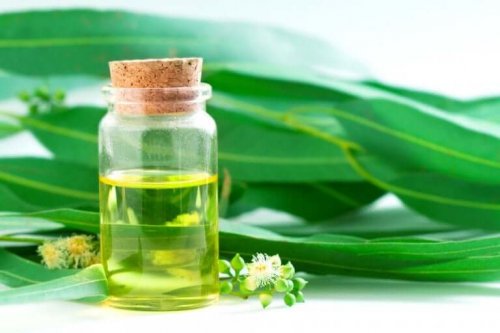3 Natural and Homemade Mosquito Repellents

To protect your skin from mosquito bites, it’s not strictly necessary to use a repellent made with chemical compounds. Although this variety of products is common in the market, there are natural alternatives with similar properties.
People are prone to getting mosquito bites due to a combination of factors such as odor, light, heat, and humidity. While most bites cause only minor skin discomfort, they can sometimes transmit diseases in some regions of the world.
Keep reading to find out how you can prepare your own homemade mosquito repellents!
You might like: 10 Aromas that Fight off Mosquitoes
Protect yourself with homemade mosquito repellents
You can make some homemade mosquito repellents to help protect your skin from mosquito bites without resorting to chemical formulas. Many people are opting for these types of solutions for mosquitos bites for many different reasons. In addition to being safer for your health and preventing unwanted side effects, these remedies don’t pollute the environment.
The most interesting thing is that they’re easy to prepare and the ingredients are easily available. These homemade mosquito repellents are also cheaper and usually suitable for all skin types.
Have you still not tried any of these? Discover three different recipes below!
You might like: How to Use Vitamin B1 as a Mosquito Repellent
1. Eucalyptus and lemon oil repellent

This type of oil has properties that keep mosquitoes away for up to three hours, according to some studies.
This oil is one of the most popular mixtures for protecting the skin from mosquito bites. In fact, it’s recommended by organizations such as the Center for Disease Control and Prevention (CDC) as an alternative solution to conventional bug sprays.
Recent research found that a solution with 32% lemon and eucalyptus oil can provide up to 95% protection against mosquitoes for three hours. However, more studies are necessary to support these claims.
Recipe
Although this mixture is available in many commercial products, you can easily prepare it at home with 100% natural ingredients. However, it’s not recommended for use in children under three years of age.
Ingredients
- 1 teaspoon of eucalyptus and lemon oil (5 ml)
- 10 tablespoons of sunflower oil (100 ml)
Preparation
- First, pour the lemon and eucalyptus oil into a container.
- Then, mix it with the sunflower oil until you obtain a homogeneous product.
How to use
- Rub the product on the exposed areas of your skin and leave it on without rinsing it off.
- Use it whenever you do outdoor activities.
2. Lavender repellent
The fragrance of lavender is uncomfortable for mosquitoes and other insects. That’s why people have been using it as an alternative solution to prevent bites for decades. Even a study in mice determined that lavender essential oil is effective in repelling adult mosquitoes.
Although more research is necessary to verify its effect on humans, many people often use lavender for this purpose. Among other things, lavender has analgesic and antiseptic effects that help calm and soothe the skin if a sting does occur.
Ingredients
- 5 tablespoons of crushed lavender flowers (100 g)
- 10 tablespoons of extra virgin olive or almond oil (100 ml)
Preparation
- First, crush the lavender flowers and put them in a jar.
- Then cover them with the oil and leave to marinate.
How to use
- When the oil is ready, rub it onto areas sensitive to stings such as the arms and ankles.
You might like: What Happens when You Get a Mosquito Bite?
3. Cinnamon repellent

If diluted properly, you can apply cinnamon oil to your skin to help repel insects.
Cinnamon essential oil has some interesting uses for humans. Not only is it a favorite for aromatherapy sessions, but it also serves as the foundation for many natural remedies. In this case, we propose its use as a repellent to protect the skin from mosquito bites.
Ingredients
- 1/2 teaspoon of cinnamon essential oil (3 ml)
- 1/4 cup water (62.5 ml)
Preparation
- Put the ingredients in a container and mix them together well.
How to use
- Spray the repellent on clothing and exposed areas of the skin.
- You can also spray it in the surroundings of your house, on your upholstery, or around your plants.
Caution: Avoid using undiluted cinnamon oil, as a concentrated dose can cause unwanted skin reactions.
Homemade mosquito repellents: conclusion
Remember to increase your protection against mosquitoes by wearing clothing that covers your skin as much as possible, especially during trips to the woods or countryside, outdoor work, trips to tropical areas, etc.
If you suffer a bite, avoid scratching yourself to prevent complications. In case of signs of infection or severe allergy, see a doctor.
All cited sources were thoroughly reviewed by our team to ensure their quality, reliability, currency, and validity. The bibliography of this article was considered reliable and of academic or scientific accuracy.
- Frances, S. P., Rigby, L. M., & Chow, W. K. (2014). Comparative Laboratory and Field Evaluation of Repellent Formulations Containing Deet and Lemon Eucalyptus Oil Against Mosquitoes in Queensland, Australia 1 . Journal of the American Mosquito Control Association. https://doi.org/10.2987/13-6366.1
- Fradin, M. S., & Day, J. F. (2002). Comparative Efficacy of Insect Repellents against Mosquito Bites. New England Journal of Medicine. https://doi.org/10.1056/nejmoa011699
- Choi, W.-S., Park, B.-S., Ku, S.-K., & Lee, S.-E. (2002). Repellent activities of essential oils and monoterpenes against Culex pipiens pallens. Journal of the American Mosquito Control Association.
This text is provided for informational purposes only and does not replace consultation with a professional. If in doubt, consult your specialist.








